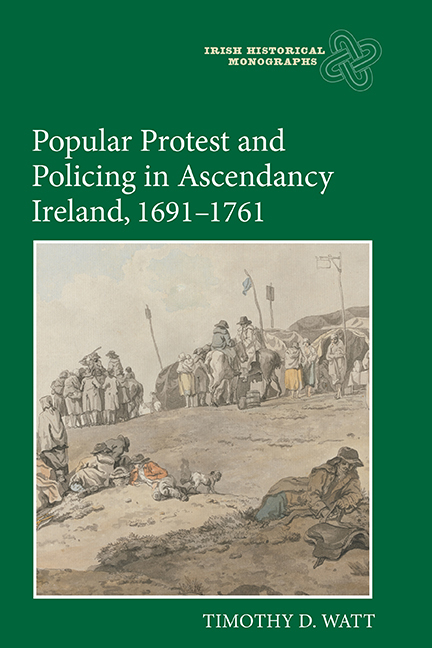Book contents
- Frontmatter
- Dedication
- Contents
- List of illustrations
- Acknowledgements
- Principal abbreviations
- Notes on conventions
- Glossary
- Introduction
- Part One Policing and large-scale disorder
- Part Two Popular Protest and Collective Action
- 4 ‘Mobs’, Authorities and Popular Politics
- 5 A ‘Rebellious Traditional Culture’ in Ireland
- 6 ‘Riot and Rescue’ and Anti-Taxation Protest
- 7 Journeymen, Masters and ‘Collective Bargaining by Riot’ in Dublin
- 8 Factional Gangs, Authorities and Corruption of the Law in Dublin
- 9 Conclusion
- Appendix: Irish Combination Acts, 1705–80
- Bibliography
- Index
- Irish Historical Monographs previous volumes
7 - Journeymen, Masters and ‘Collective Bargaining by Riot’ in Dublin
from Part Two - Popular Protest and Collective Action
Published online by Cambridge University Press: 12 October 2019
- Frontmatter
- Dedication
- Contents
- List of illustrations
- Acknowledgements
- Principal abbreviations
- Notes on conventions
- Glossary
- Introduction
- Part One Policing and large-scale disorder
- Part Two Popular Protest and Collective Action
- 4 ‘Mobs’, Authorities and Popular Politics
- 5 A ‘Rebellious Traditional Culture’ in Ireland
- 6 ‘Riot and Rescue’ and Anti-Taxation Protest
- 7 Journeymen, Masters and ‘Collective Bargaining by Riot’ in Dublin
- 8 Factional Gangs, Authorities and Corruption of the Law in Dublin
- 9 Conclusion
- Appendix: Irish Combination Acts, 1705–80
- Bibliography
- Index
- Irish Historical Monographs previous volumes
Summary
Life could be extremely precarious for thousands of silk, woollen and linen weavers, domestic servants and labourers who were packed into the compact lanes and alleyways in the Smithfield, Coombe and Liberties areas of Dublin. Many people, described by Ian McBride as ‘anonymous working communities’, had moved to the city from its hinterland in order to find employment and improve their quality of life, but the conditions that they found there were often overcrowded, damp and insanitary. Even by eighteenth-century standards the circumstances in which the lower orders in Dublin were compelled to live were forbidding, but they could get significantly worse in periods of economic downturns and poor harvests. In the winter of 1728/9, thousands of unemployed journeymen weavers survived by receiving charitable handouts from wealthy merchants or had to enter the workhouse in order to get some relief. Others were reduced to feeding on blood from slaughter houses as the market for their goods collapsed. Descriptions of similarly appalling conditions appeared nearly thirty years later. According to a report from St Catherine's parish in 1757, 978 families, comprising 3,202 people, required ‘immediate relief’ from the effects of hunger, and near double that number appeared to be ‘in a very low and necessitous condition’. The report stated that numbers of ‘these poor creatures’ were walking about ‘like moving statues, with pale faces and tottering limbs, while their children at home are lingering under unsupportable want by their parents not being employed’. Many families, ‘whose modesty would not permit them to beg’, were compelled to eat ‘blood and garbage with which swine are fed’. Journeymen could face difficulties even when economic conditions were improving. In 1719, for example, when prices for manufactured goods were rising, the feltmakers’ guild disqualified any journeymen who left employers in order to work for others offering higher rates of pay. Also, according to an act 158 to prevent unlawful combinations, passed by the Irish parliament in 1730, artificers, workmen, servants and labourers could be fined up to five pounds if they left the service of an employer before the end of an agreed term, were absent from work for more than three days, or returned any unfinished pieces of work.
- Type
- Chapter
- Information
- Popular Protest and Policing in Ascendancy Ireland, 1691-1761 , pp. 157 - 179Publisher: Boydell & BrewerPrint publication year: 2018



